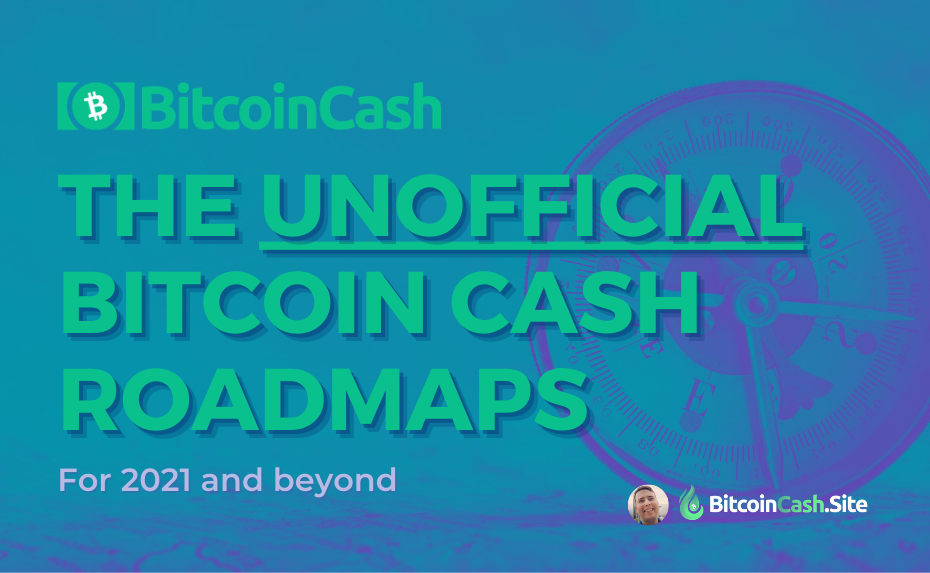What Bitcoin Cash Developers are Building Right Now: (Unofficial) Bitcoin Cash BCH 2021 Roadmaps

Bitcoin Cash developers are newly energized and building lots of improvements, new features, new projects and businesses in the wake of the successful ecosystem collaboration on the new ASERT difficulty adjustment algorithm (DAA) and the resounding defeat of the Bitcoin ABC infrastructure funding plan (IFP).
Continuity, and More
Bitcoin Cash has no official roadmap but developers say they remain committed to the spirit of the early BCH roadmap. Bitcoin Cash is a true marketplace, where anyone can build anything — no permission needed!
So it only makes sense to realize that no single person or organization can or should limit the vibrancy of the BCH marketplace with any single plan or roadmap document. The global market is always moving forward, and BCH moves with it.
It goes without saying that all teams remaining after the 15 November 2020 network upgrade support the preservation of Bitcoin Cash’s sound money properties as well as the total supply limit, emission schedule, the SHA-256 mining algorithm, low fees and other basic characteristics that Bitcoin Cash is known for.
Adoption is Priority #1
Bitcoin Cash is pushing forward with adoption, creating products that will delight consumers, new features that support complete consumer and merchant solutions, and plans to onboard hundreds of thousands of new users, developers, investors and more.
Bitcoin Cash is peer-to-peer electronic cash for the world, where no one is excluded by nation-state laws nor excessive transaction fees. Bitcoin Cash is for everyone, everywhere to safeguard value, spend, save, transact, remit and build.
Bitcoin Cash is unstoppable.
For Journalists, Investors and Others Doing a Deep Dive
This piece is a long read but it is also a unified, indexed reference. So please share it with journalists, investors, anyone denying that Bitcoin Cash has a "roadmap" post-ABC and anyone else who wants to take a deep dive into what Bitcoin Cash is working on for the future. Thanks in advance. Questions and feedback welcome.
Table of Contents
Scalenet & Testnet 4
Independent developer Jonathan Toomim announced on 6 October 2020 the creation of a new testnet infrastructure for Bitcoin Cash. Testnet4 permits Bitcoin Cash developers to try out new transaction formats and applications. Testnet4 blocks are CPU-mineable and should sync fast on low-end hardware.
Scalenet, on the other hand, serves to stress-test large BCH blocks, and starts with an initial default block size limit of 256 MB. Scalenet is a cooperative endeavor of multiple full node software projects where different teams and developers may actually compete to create the best scaling solutions for Bitcoin Cash
“Scalenet is intended to be a high-volume blockchain which is ideal for spamming and stress testing software. It comes with a 256 MB initial default block size limit, and uses aserti3 parameters that make it more suitable for accurately simulating mainnet mining difficulty (though it retains the 20-minute difficulty rule).” — Jonathan Toomim, Bitcoin developer #
Get more information:
r/btc: Scalenet and Testnet4 are online and open for business
BitcoinCashResearch.org: Testnet4 and Scalenet
Double-Spend Proofs
Tom Zander, founder of the Flowee full node software, reported his intention to implement double-spend proofs in Bitcoin Cash on 25 September 2020.
To double-spend a UTXO successfully on Bitcoin Cash requires that two transactions be signed with the same key. Double-spend proofs rely on this fact to identify any such double-spend attempts and send a message to the recipient SPV wallets to make the appropriate payment recipients aware that a given transaction may be a double-spend attempt.
The developer claims this will solve 99% of double-spend issues on Bitcoin Cash.
The BCHD and Bitcoin Cash Node full node softwares are expected to include double-spend proofs soon, and the feature has been active in the Flowee and Bitcoin Unlimited full node software for some time.
“The DSProof is a message that uses the fact that two transactions spending the same coin will need to cryptographically sign that coin. Once per transaction. These two signatures are the essence of a double spend proof. Users can verify those signatures to independently confirm that the proof is valid. That there really was a double spend.” — Tom Zander, founder at Flowee #
Get more information:
BitcoinCashResearch.org: Double Spend Proof: roadmap
GitLab: Double Spend Proof -- Spec
Faster Transaction Propagation
Jonathan Toomim announced that faster transaction relay had been merged into the Bitcoin Cash Node full node software on 29 Oct 2020.
By shortening the delay for BCH nodes to share new transactions with each other, this improvement is expected to enhance user experience (UX) and facilitate Bitcoin Cash scaling.
“A delay of 2 seconds per connection with 20 connections means that a node will broadcast an inv to one peer every 100 ms on average. This delay, coupled with the natural network ping times of ~100 ms, and the 1.5 RTT communication needed to send a tx, means that the number of nodes who have a transaction will double roughly every (100 ms + 150 ms) = 250 ms if all network nodes used a 2 second delay with 20 peers. If the network is comprised of 8192 nodes, it would take around 3.25 seconds for a transaction to propagate through the full netowrk. This worsens BCH's UX by making transactions feel slower in 0-conf mode, and gives a much larger time window for double-spends than is desirable.” — Jonathan Toomim, Bitcoin developer #
Get more information:
Increased Chained-Transaction Limit
In the Bitcoin Cash Network Discussion livestream on 4 Oct 2020, Bitcoin Cash Node developer Calin Culianu announced his intention to increase the chained-transaction limit on Bitcoin Cash to 500 in the short-term, and even higher in the future.
One way that improvements in the chained-transaction limit might be implemented is by weakening or removing the child-pays-for-parent (CPFP) functionality, which Culianu says is hardly used.
Chained transactions are when a UTXO, or coin, is spent over and over again in between blocks. Online gambling and gaming apps as well as BCH distribution apps such as gifts.bitcoin.com are affected by the current chained-transaction limit of 50. It also represents an inconvenience when airdropping Bitcoin Cash at meetups and conferences, or when making many purchases in a small period of time from a single wallet.
Get more information:
Script Calculations
“Emergent_reasons”, a developer for both Bitcoin Cash Node and AnyHedge, aims to improve Bitcoin Cash script calculations by enabling larger numbers and a new op code.
“Having larger numbers in script will simplify scripts involving arbitrary satoshi amounts and other calculations. Perhaps even more importantly, it will make those scripts safer where the scripts are currently required to use additional artificial calculation techniques. It is possible that it will increase the number of use cases as well, for example where artificial calculation techniques may not cover all needs or may be impossible to fit in script size limits.” — emergent_reasons, Bitcoin Cash Node developer #
Get more information:
BitcoinCashResearch.org: Improve utility of script calculations - larger numbers + op_mul
Bobtail + Storm = Tailstorm
Bitcoin Unlimited developer George Bissias announced on 31 August 2020 his intention to improve the security of Bitcoin Cash zero-confirmation (“zero-conf”) transactions using the Tailstorm protocol.
Tailstorm is a hybrid of Storm and Bobtail that introduces a concept called subblocks. Subblocks would ensure that no double-spends are included within any given subblock, and would become the components of full blocks as we know them today. Subblocks would be incentivized with a fraction of the block reward.
Because subblocks would be assigned a calculated probability of inclusion into the next full block, they would represent an important step towards instant finality of Bitcoin Cash transactions.
This technology may also make it more difficult for miners to pick and choose which transactions to include in any given block, which could result in stronger censorship-resistance for BCH.
“Beyond zero-conf capabilities, the protocol's minimization of block interval variance dramatically improves UX for certain types of transfers, notably any type of live exchange where two users are waiting for at least one confirmation. This type of exchange is important for many P2P use cases…” — George Bissias, Bitcoin Unlimited developer #
Get more information:
Bitcoi.in Forum: BUIP151: Further Development of the Bobtail/Storm Protocol
r/btc: BUIP151: Further Development of the Bobtail/Storm Protocol
Teams
Bitcoin Cash is many teams and here is what some of those teams are working on for Bitcoin Cash heading into 2021.
AnyHedge
AnyHedge is “the first financial derivative using smart contracts on the Bitcoin Cash blockchain,” according to General Protocols president and developer John Nieri, AKA “emergent_reasons”.
The AnyHedge team plans to work with the forthcoming non-custodial exchange Detoken to create a marketplace for AnyHedge that onboards new users to Bitcoin Cash.
Get more information:
BA.net
Bitcoin Apps Net, or BAnet, have developed a turnkey Bitcoin Cash DEX (decentralized exchange) that is non-custodial, has automated market making and includes SLP tokens.
Get more information:
BA.net: Add a DEX to your Bitcoin Cash Trading Desk (with video demo)
BCHD
BCHD is a full node software for Bitcoin Cash written in the Go programming language that is forked from BTCD. BCHD’s gRPC interface, in particular, is fast, well-designed and widely used by BCH apps. Furthermore, the BCHD client already has no chained transaction limit, unlike other options on the market. The BCHD team includes developers Chris Pacia and Josh Ellithorpe.
The BCHD team is working on the following.
double-spend proofs integration is 95% complete.
network compatibility, including writing tests and backport code from scratch in Go.
a new SLP transaction index that will be accessible via BCHD’s gRPC API and is shipping this month.
a Neutrino beta wallet release for Android (which is already out).
and more.
BCHD is now mining ready and has successfully mined blocks on testnet.
Get more information:
BitCash
BitCash is the main Python library for Bitcoin Cash and is maintained by Corentin Mercier and Teran McKinney. The team is working on making it as easy as possible for new developers to get started with Bitcoin Cash apps via BitCash.
Get more information
GitHub: bitcash
Bitcoin.com
The Bitcoin.com team has added new functionality to their market-leading mobile wallet recently, including the following:
the ability to turn off BTC support.
the ability for cloud backup of the user’s private key.
SLP token support.
live price charts.
integrated stablecoins.
and more.
Get more information:
bitcoincashj
Bitcoin Cash developer pokkst maintains and develops the bitcoincashj library, which is a Java implementation of Bitcoin Cash that apps such as the Bitcoin.com Bitcoin Cash Register and the Crescent Cash wallet depend on.
Expected near-term improvements to bitcoincashj include the following:
better SLP integration.
detailed documentation.
Memo support (memo.cash).
bitcoinj backports.
Get more information:
Bitcoin Cash Node
The Bitcoin Cash Node full node software team (BCHN) is actively collaborating with a number of teams, projects and developers on a variety of projects, including, but not limited to, the following.
mempool & wallet code optimizations.
scalenet & testnets.
increasing the chained-transaction limit.
adding new mathematical operations to smart contract scripting.
the Xthinner and Graphene protocols to improve block propagation times and reduce orphan rates.
double-spend proofs.
UTXO/UtreeXO commitments.
enabling the use of all CPU cores for block validation.
adaptive block size.
pre-consensus (such as Tailstorm or Avalanche).
and more.
“BCHN supports and works toward the goals of the common Bitcoin Cash vision … linked at bitcoincash.org.” - freetrader, lead maintainer at Bitcoin Cash Node #
Get more information:
Asymmetric Moving Maximum Block Size Consensus Rule Based On Median Block Size
r/btc: What is BCHN’s roadmap, is it the same as bitcoincash.org?
Bitcoin Unlimited
Bitcoin Unlimited (BU) is a membership-based organization with a long history of supporting big-block Bitcoin. BU develops a Bitcoin Cash full node software called Bitcoin Cash Unlimited.
BU is focused on the following priorities:
OP_GROUP, which is a proposed new op code that would permit the holding of non-fungible tokens on the BCH blockchain, perhaps representing non-chain assets such as stocks, other tokenized securities and fiat currency. With OP_GROUP, BU aims to create best-in-class asset definition on Bitcoin Cash.
increasing the chained-transaction limit, which is already at 500 in BCH Unlimited
developer onboarding via the Bitcoin Cash specification project at reference.cash.
the Bitcoin Unlimited Voting app (including an Android app) that uses smart contracts for on-chain voting.
a hackathon called CoinParty for Dec 2020.
Get more information:
Bitcoin Verde
Bitcoin Verde is a Java full node software for Bitcoin Cash that is maintained by a team of 4 developers based in Columbus, Ohio led by Josh Green. The team is focused on the following.
removing the chained-transaction limit.
creating a non-indexing module in order to become a viable BCH mining full node software.
creation of a block template validation service that would permit miners to run different BCH full node softwares with a reduced risk of chain split or orphans in service of the goal of Bitcoin Cash full node diversity. (Expected for May 2021.)
adding Memo support to the Bitcoin Verde block explorer.
the first Bitcoin Cash specification, in collaboration with Bitcoin Unlimited.
and more.
“There is a risk that blocks mined by miners could cause a chain split or be orphaned due to being incompatible between node implementations. From a miner's perspective, even a small risk associated with these incompatibilities can have a large impact on profitability. This incompatibility risk increases the incentive for miners and pools to all run the same implementation, which greatly reduces node-diversity between miners. This block template validation service (TVS) aims to reduce the risk of the miners creating an invalid block to near-zero by validating the template block against other implementations before any work is performed on the block template.” — Bitcoin Verde flipstarter #
Get more information:
Blockcurators GmbH
CoinKit is a cryptocurrency tipbot service created and run by Blockcurators GmbH. CoinKit, unlike other tipping bots, creates all its transactions on-chain, thus eliminating the need for a permissioned database behind the scenes.
CoinKit includes all the common tipping commands, already supports many coins and works on Slack, Discord, Telegram and Twitter.
CoinKit has recently integrated Bitcoin Cash BCH into their service.
Get more information:
Detoken
Detoken is a forthcoming exchange that promises to be non-custodial, permissionless, integrate SLP tokens and offer DeFi (decentralized finance) products on Bitcoin Cash.
Get more information:
cryptophyl.com: Making way for Detoken: Cryptophyl is going offline in 14 days
r/btc: Let's talk about Detoken
Electron Cash
The Electron Cash wallet is foundational to many use cases and projects in Bitcoin Cash. Here is what the team is currently working on:
SLP token support.
Reusable private addresses (RPAs) enable users to disconnect the public address they give out for payment with the actual public key address that gets paid to, and to have multiple public key addresses in use under one RPA seamlessly in order to maximize user privacy.
CashFusion improvements.
Android app updates.
improved documentation.
and more.
Get more information:
Flipstarter
Flipstarter is a fundraising tool that uses assurance contracts to ensure only fully-funded proposals have their pledges turned into actual funding transactions. The Flipstarter team is implementing a series of improvements.
Get more information:
Flowee the Hub
Flowee is a line of complementary Bitcoin Cash software products that are aimed at making it easier for BCH app builders. Tom Zander is the founder of Flowee, and is working on these projects:
double-spend proofs.
a new payment protocol called “next” that would supersede BIP70 and related payment protocols, reduce fraud risks and include more information about payments in wallets.
research into how to enable miners to select transactions for block creation based on various factors that might assist in keeping spam under control as BCH adoption increases.
a new wallet in collaboration with other teams and developers that permits anyone to skin it to suit their branding and other needs.
“I believe that the number one reason we are not growing faster is the user experience for merchants and buyers. Both on the Internet as well as in brick/mortar stores there is a lot that we can still improve upon. The positive impact is hard to measure, but essentially this will be a boon for adoption.” — Tom Zander, founder of Flowee #
Get more information:
BitcoinCashResearch.org: Payment Protocol “Next”
BitcoinCashResearch.org: Fee Research
Jochen Hoenicke
Jochen Hoenicke of Albert-Ludwigs-University of Freiburg and the creator of a popular website on mempool statistics is working on increasing P2SH addresses from 160-bit to 256-bit in order to reduce the risk of collision attacks in smart contracts.
“This is both a consensus change (soft fork) and a wallet infrastructure change. If wallets don’t support the new address format, they obviously cannot be used to fund a smart contract using the new addresses. This also affects withdrawal addresses on exchanges or hardware wallets. The wallet change doesn’t have to be deployed by all wallets at the same time, though, since a different wallet can be used to fund the smart contract address.” — Jochen Hoenicke, Chair of Software Engineering at Albert-Ludwigs-University of Freiburg #
Get more information:
BitcoinCashResearch.org: 256-bit P2SH addresses
Jonathan Silverblood
Jonathan Silverblood is the Lead Developer at General Protocols, the company building AnyHedge. In addition to General Protocols projects, he is also working on adding multiple OP_RETURN fields to Bitcoin Cash in order to make OP_RETURN-based protocols interoperable.
“By supporting multiple OP_RETURNs in a way that makes it possible to have interoperable OP_RETURN protocols, we signal to developers that are interested in making such protocol that BCH desires their business. This would allow new use cases as well as empower existing use cases, ultimately working towards more adoption and a stronger network effect for BCH.” - Jonathan Silverblood, lead developer at General Protocols #
Get more information:
BitcoinCashResearch.org: Multiple OP_RETURNs
Jonathan Toomim
Jonathan Toomim is a long-time Bitcoin developer and miner who played the key role in preparing the new ASERT DAA for the 15 Nov 2020 network upgrade and building community consensus around it.
Jonathan is working on the following:
increasing the chained-transaction limit with code contributions that triple block validation speed and block template creation speed.
upgrading Bitcoin Cash Node to be able to send 300 transactions per second.
exploring the replacement of TCP with KCP to achieve increased network throughput and reduced latency, which may improve node communications between Chinese miners and the rest of the world.
Xthinner for faster block propagation.
the Blocktorrent protocol, which “allows blocks to be transmitted in a swarm at the speed of Bittorrent instead of Napster”.
scaling to 1 GB blocks and beyond, particularly via scalenet.
a proposal to replace the block-size soft limit with a CPU-time soft limit, so that miners can make larger blocks with less risk.
a reduction in the block time from the current ~10 minutes to between 1 and 2.5 minutes, perhaps with a DAG-based approach.
parallelization of Bitcoin Cash Node in order to make better use of multi-core CPUs.
UX improvements.
make solo mining easier.
continued development on the “liquid coinocracy” idea.
faster transaction relay.
and more.
Get more information:
GitLab: Jonathan Toomim merge requests for Bitcoin Cash Node
GitLab: Add -maxgbttime and -maxinitialgbttime command-line options
Knuth Node
The Knuth full node project is run by lead developer Fernando Pelliccioni, formerly of BitPrim, an experienced C++ developer and long-time Bitcoin developer.
Knuth is not currently widely used for mining but aims to change that by ensuring interoperability between their node and other mining nodes in the BCH ecosystem.
Knuth also aims to add these features to its full node software:
removal of the chained transaction limited.
incorporation of double-spend proofs from Flowee.
addition of a high-performance SLP full indexer.
a mining API with better performance than existing options.
scalenet & testnet4.
Xthinner to improve BCH block propagation.
improvement of block validation times and block template creation via Merkle-root algorithm optimization.
and more.
Knuth is also working to facilitate new developer onboarding by creating a set of libraries in a variety of programming languages aimed at simplifying wallet and app development on Bitcoin Cash. Languages Knuth is developing these libraries for include:
Java
Python
C, C++ and C#
Javascript
Go
and more.
Get more information:
mainnet.cash
The founder of read.cash is creating a series of libraries and services, mainly in Javascript, that will greatly facilitate Bitcoin Cash app development.
Get more information:
Mark Lundeberg
Mark Lundeberg is an independent Bitcoin Cash developer and former physicist who first developed the new ASERT difficulty adjustment algorithm (DAA) that will be deployed to the Bitcoin Cash mainnet on 15 November 2020 (thanks to further work by Jonathan Toomim and others). Mark has worked on SLP tokens, OpenSwap, Schnorr signatures, Cash Fusion and more in the past.
Going forward, he is focused on the following:
continued improvements to CashFusion permissionless coin mixing.
scripting improvements.
Get more information:
Member.cash
Member.cash is a censorship-resistant social network where user identities are based on Bitcoin Cash public key addresses and and data is stored on-chain. The lead developer is FreeTrade68, who also works on memo.cash — another BCH social network which essentially interoperates with member.cash.
Member.cash is working on the following:
marketing in order to onboard new users and generate an increase in on-chain transactions for Bitcoin Cash.
quote re-members (like quote retweets).
more extensive notifications to increase stickiness.
post previews.
mobile notifications.
a BCH faucet.
a more modern website design.
a desktop app for Windows.
and more.
Get more information:
PayButton
PayButton enables anyone to accept Bitcoin Cash on a website with an easy-to-set-up widget. They plan to make the following enhancements:
funding goals.
“Pay” pages with simple URLs.
CashAccounts support.
the option to use xpub keys for added reliability.
paywall functionality.
and more.
Get more information:
Simple Ledger, inc.
The company behind the simple ledger protocol (SLP) for tokens on Bitcoin Cash is working on the TokenAuth.io platform, which is aimed at SLP event ticketing.
Visit simpleledger.io to learn more.
Zapit
Zapit is a new and promising Bitcoin Cash and SLP token wallet that bills itself as “the universal payment app.” Zapit developer Romit is based in India.
Zapit recently introduced the following:
and more.
Get more information:
Google Play: Download Zapit for Android
Other Projects Under Development
Adoption
Satoshi’s Angels (education, adoption and connecting Eastern and Western communities)
Breaking Bitcoin - A Feature Documentary about The Great Bitcoin Scaling Debate
BitcoinCash.site: A Marketing & Business Onboarding Hub for Bitcoin Cash
Melis wallet (adding SLP tokens soon)
GoCrypto (Europe)
XPay (Latin America)
Poype.io (Bulgaria)
Panmoni (Latin America)
elBitcoin.org (Spanish)
Paytaca Wallet (Philippines)
and many, many more meetup groups
Governance
Gaming
SLP Tokens
And More
Related Content
“Scaling Bitcoin Cash” by Tom Zander of Flowee the Hub (full node)
“2021 BCH upgrade items brainstorm“ at BitcoinCashResearch.org
“BCH: Looking back and Moving forward” by Andrew Stone of Bitcoin Unlimited
“Does Bitcoin Cash Need Governance? A Panel Discussion” 1h40m
The Early Roadmap
Developers say they still follow the spirit of the early Bitcoin Cash roadmap.

Conclusion
Although Bitcoin Cash has no official roadmap, lead developer or “core team”, a diverse and capable group of BCH developers are creating a vibrant marketplace of development options and directions for the future of Bitcoin Cash.
They are building the next generation of Bitcoin Cash — a new beginning — collaboratively and cooperatively right now.
You can be a part of it. Build your business, get up to speed on Bitcoin Cash, learn to code, develop an app, start mining, invest or just buy your first BCH at local.bitcoin.com. There are no limits on your development in the world of Bitcoin Cash.
Stay tuned for more exciting developments in the Bitcoin Cash BCH space, including a mini-documentary where you can hear direct from some of these developers about what they are working on to create world-scale, censorship-resistant peer-to-peer electronic cash — Bitcoin Cash.
On the Use of the Word "Roadmap"
Roadmap is a tricky word in the Bitcoin Cash ecosystem because investors want to know the ecosystem is moving towards something. They want to be able to hold the developer community accountable, or at least be able to recognize when something is wrong so they can exit or reduce their BCH holdings.
Or buy more Bitcoin Cash if they see promising new developments.
In the minds of many holders, no roadmap means they are blind.
But there are others for whom "roadmap" is a dirty word that suggests centralization and dictatorship. Bitcoin Cash is not a company or a centralized software team. The network has no roadmap. It is a pure market that responds to market signals, needs and incentives.
In the Bitcoin Cash ecosystem, there is no official roadmap but individual teams have their own plans, goals and directions for their work on Bitcoin Cash that can fairly be represented as "roadmaps".
In this way, we can bridge the communications gap with people who do not (yet?) value decentralization as highly as we do. We can meet more mainstream value creators where they are and invite them to add their value to the Bitcoin Cash network in a way they can easily understand.
I welcome feedback and conversation on this point.

Corrections
I take full responsibility for errors and omissions. If I have a mistake here or left you out, please email george@panmoni.com or DM me at t.me/georgedonnelly. Thanks in advance for your help and patience!
Credits
Thanks to these individuals for submitting video for the forthcoming mini-documentary:
Mike Komaransky
Roger Ver
Eleonore Blanc
Corentin Mercier
Tom Zander
Dagur
Akane Yokoo
Precious Sunday Effiang
Josh Green
Jose Araujo
Fernando Pelliccioni
Jajaa Siradar
Joemar Taganna
Francesco Simoncelli
Liberlander Yoshi Livo
Thanks to many many people who have answered questions for me and pointed me in the right direction including but not limited to:
Calin Culianu
John Nieri
John Moriarty
Andrew Stone
Fernando Pelliccioni
and many others.
N.B. None of these individuals bear any responsibility for the content of the article.


What a great write-up. Thank you George.